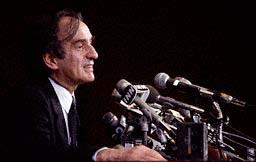December 1-7, 2000
Norman G. Finkelstein and the packaging of the Holocaust by Greg Goldin "I SOMETIMES think," writes Norman G. Finkelstein, whose parents survived the Warsaw ghetto and the concentration camps, "that American Jewry 'discovering' the Nazi Holocaust was worse than its having been forgotten. True, my parents brooded in private; the suffering they endured was not publicly validated. But wasn't that better than the current crass exploitation of Jewish martyrdom?" That is the first bombshell in Finkelstein's acrimonious new book, in which he declares the recent successful pursuit of multibillion-dollar reparations from German industrial giants and Swiss bankers "an outright extortion racket." Finkelstein's downright pugilistic book delivers a wallop -- mostly because few authors have had the courage or nerve to say, as he does, that the Nazi genocide has been distorted and robbed of its true moral lessons and instead has been put to use as "an indispensable ideological weapon." It's a provocative thesis that makes you want to reject it even as you are compelled to keep reading by the strength of his case and the bravura of his assertions. What Finkelstein calls "The Holocaust" -- the packaged story as distinguished from the actual historical events -- has become a "prize alibi" for Israeli war crimes, a cudgel for money-hungry Jewish organizations and profiteering lawyers, and a spark plug for the recrudescent ranks of anti-Semites in Europe.
Finkelstein, who teaches political theory at New York University and Hunter College, begins with an examination of the 1967 Arab-Israeli War. Only after that conflict, he says, did the Holocaust become an abiding moral symbol -- not because the existence of a Jewish state was suddenly threatened (Israel trounced its rivals), but because the American Jewish establishment instinctively understood that a shroud of victimhood could immunize Israel in its atrocious acts against the Palestinians and the rest of the Arab world. Before the Six Day War, Finkelstein writes, both the Holocaust and Israel were something of a liability to American Jews; the American Jewish establishment built its strength through obeisance to postwar American domestic and global ambitions. "Doing so in effect facilitated the traditional goals of assimilation and access to power." Germany had become a key ally against the Soviets, and "dredging up the past served no useful purpose; in fact, it complicated matters." A wave of anti-German sentiment, fueled by the close memory of the Nazi extermination, could sour the budding Cold War realignment of West vs. East. The leading Jewish groups and intellectuals did not want to be spoilers -- for fear that they'd be accused of disloyalty and that they'd provoke an anti-Semitic backlash at home. This led them to "downplay the Nazi Holocaust" -- they opposed both boycotts of German manufacturers and public demonstrations against former Nazis visiting the United States (in official capacities) -- and to fall "into line with U.S. support for a rearmed and barely de-Nazified Germany." The Six Day War, says Finkelstein, changed all that. Israel dominated and became, in earnest, a bullying, expansionist state. It was then, with the repositioning of Israel within the world, he says, that the Holocaust was "rediscovered." In the aftermath of World War II, Jews stressed the universality -- the commonality and historical redundancy -- of the Final Solution. This was what Hannah Arendt famously referred to, in Eichmann in Jerusalem, as the "banality of evil." That changed: "The first and most important claim that emerged from the 1967 war and became emblematic of American Judaism [was that] the Holocaust . . . was unique, without parallel in human history," Finkelstein says, quoting the historian Jacob Neusner.
And business, it seems, is booming. Swiss banks, which allegedly were sitting on billions in dormant accounts of Jewish victims of Nazi persecution, agreed in August 1998 to pay a $1.25 billion settlement. In December 1999, German corporations, among them Volkswagen and Siemens, coughed up $5.2 billion to compensate Nazi-era slave laborers. Finkelstein angrily denounces these payments as part of the "Holocaust-restitution racket." The Swiss, he says, were "easy prey. Few would sympathize with rich Swiss bankers against 'needy Holocaust survivors.'" "The campaign," he continues, "rapidly degenerated into a libel of the Swiss people." Finkelstein quotes one "typical report," subtitled "a 50-year Swiss-Nazi conspiracy to steal billions from Europe's Jews and Holocaust survivors": "Switzerland's small breed of bankers has become greedier and more immoral than most." This amounted to "the greatest robbery in the history of mankind." The barrage against the Swiss was launched around the same time that Paul Volcker, former chairman of the U.S. Federal Reserve, began a $500 million audit of the dormant accounts. Volcker reported that "There was no evidence of systematic discrimination, obstruction of access, misappropriation, or violation [of the] requirements of Swiss law." Similarly, Finkelstein claims, "It is simply untrue that [slave laborers] hadn't received any compensation. [They] were covered under the original agreements with Germany compensating concentration-camp inmates." Those payments, Finkelstein reports, were the equivalent of $1 billion today. "Still, 50 years later the Holocaust industry was demanding money for 'needy Holocaust victims' who had been living in poverty because Germans allegedly never compensated them." The assertion that "injuries" are being conjured long after compensation was made may be correct, but one wonders whether Finkelstein hasn't been blinded by his own venom. He writes, "The current campaign of the Holocaust industry to extort money from Europe in the name of 'needy Holocaust victims' has shrunk the moral stature of their martyrdom to that of a Monte Carlo casino." Finkelstein's harsh rhetoric obscures the fact that there was once a fierce debate within the Jewish community over the question of "blood money." In 1952, when Israeli Prime Minister David
Ben Gurion accepted Germany's offer of compensation,
Menachem Begin led a throng that nearly torched the
Israeli parliament. One wishes, in reading this slender,
incendiary volume, that Finkelstein had tempered his
justified anger at those who would cash in on the Holocaust
with the acknowledgment that reparations are for many Jews a
crude marker of their suffering and a repudiation of the
Nazi past. His animosity at times overpowers his
revelations, which sadly mars and even undermines his
heartfelt objective: to restore the Holocaust as a
shattering allegory of universal human suffering. | |
Website comment: Among the groups not listed in this report who are set to benefit: the Anti Defamation League |
 The
Moral Minority
The
Moral Minority Nowadays
such pronouncements are regarded as heresy or, worse, as
"Holocaust denial" -- a charge frequently leveled at
Finkelstein since the publication of The Holocaust Industry.
But in making these contentions he has revived a debate that
has roiled the Jewish community off and on for five decades.
Was the Holocaust unique? Or was it mundane, and all too
human?
Nowadays
such pronouncements are regarded as heresy or, worse, as
"Holocaust denial" -- a charge frequently leveled at
Finkelstein since the publication of The Holocaust Industry.
But in making these contentions he has revived a debate that
has roiled the Jewish community off and on for five decades.
Was the Holocaust unique? Or was it mundane, and all too
human? The
Holocaust stood apart from time and circumstance. History,
in this revised view, ceased to exist, and the deadly sins
of the Nazis were deemed beyond rational comprehension. To
think otherwise, or to compare the Third Reich to any other
barbaric regime in recent memory, was "trivializing" or
"Holocaust denial." Making the Holocaust unique allowed what
Finkelstein calls "Holocaust campaigners" -- most notably,
Elie Wiesel (left) -- to claim sovereignty over this
"valuable property." In effect, the Holocaust became a crown
of virtue. "Ever chastised, ever innocent: This is the
burden of being a Jew," comments Finkelstein. Or, as
Israel's jocular Foreign Minister Abba Eban once
quipped, "There's no business like Shoah business."
The
Holocaust stood apart from time and circumstance. History,
in this revised view, ceased to exist, and the deadly sins
of the Nazis were deemed beyond rational comprehension. To
think otherwise, or to compare the Third Reich to any other
barbaric regime in recent memory, was "trivializing" or
"Holocaust denial." Making the Holocaust unique allowed what
Finkelstein calls "Holocaust campaigners" -- most notably,
Elie Wiesel (left) -- to claim sovereignty over this
"valuable property." In effect, the Holocaust became a crown
of virtue. "Ever chastised, ever innocent: This is the
burden of being a Jew," comments Finkelstein. Or, as
Israel's jocular Foreign Minister Abba Eban once
quipped, "There's no business like Shoah business."